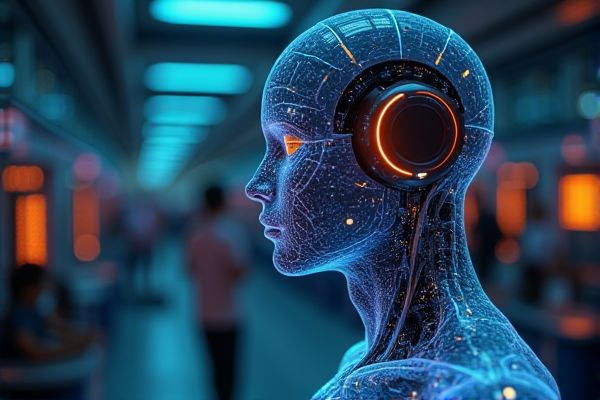
AI enhances personalized workout plans by analyzing individual fitness levels, goals, and preferences. Through smart wearables, it monitors real-time performance data such as heart rate and calorie burn, providing immediate feedback for optimal results. Virtual trainers leverage AI algorithms to guide users with tailored exercises and technique corrections, making workouts more effective. AI-driven nutrition apps offer customized meal plans based on dietary needs and fitness objectives, supporting overall wellness and healthy lifestyle choices.
AI usage in fitness
Personalized Workout Plans
Personalized workout plans created by AI can enhance individual fitness outcomes by adapting to users' specific goals and physical conditions. For example, a user at a gym like Gold's Gym might receive tailored recommendations based on their fitness level and preferences. This can increase motivation and accountability, leading to higher adherence to workout routines. The potential for constant updates can further optimize progress as users evolve over time.
AI-driven Wearable Technology
AI-driven wearable technology has the potential to enhance fitness outcomes by providing personalized data analysis. For example, smartwatches can track heart rate, sleep patterns, and workout intensity, allowing users to adjust their routines more effectively. This tailored feedback can improve athletic performance and recovery times. The chance of achieving fitness goals increases as users gain insights from real-time data.
Real-time Performance Tracking
Real-time performance tracking in fitness can enhance an individual's workout regimen by providing instant feedback on metrics like heart rate and calorie burn. An example is how fitness apps like Strava allow users to monitor their real-time performance during activities such as running or cycling. This data can help users adjust their efforts and optimize their routines for better results. By leveraging AI, the future holds potential for more personalized recommendations based on individual performance patterns.
AI-based Nutrition Guidance
AI-based nutrition guidance can enhance fitness routines by providing personalized meal plans tailored to individual dietary needs. This customization may lead to improved athletic performance and healthier lifestyle choices. For instance, a fitness enthusiast using an app like MyFitnessPal can benefit from AI recommendations to optimize macronutrient intake. Such technology creates the possibility of achieving fitness goals more efficiently through informed dietary decisions.
Virtual Personal Trainers
AI can enhance fitness experiences by providing personalized workout plans through virtual personal trainers. For instance, an AI-powered app can analyze user data to suggest tailored routines that optimize performance and recovery. This technology allows for real-time feedback, potentially improving user engagement and outcomes. As gym-goers seek flexible training options, the rise of virtual personal trainers may offer a competitive edge for fitness institutions.
Injury Prevention and Rehabilitation
AI applications in fitness can enhance personalized training programs through data analysis of individual performance metrics. Utilizing AI-driven platforms like WHOOP can provide insights into recovery and strain, reducing the risk of injuries. In rehabilitation, AI tools can monitor patient progress and adapt exercises accordingly, improving recovery outcomes. These advancements present opportunities for fitness professionals to better support clients in maintaining optimal health and performance.
Gamification of Fitness Activities
AI can enhance fitness experiences by personalizing workout regimens based on individual performance data. For example, apps like MyFitnessPal leverage gamification to encourage users to track their meals and exercise patterns, making fitness more engaging. This technology introduces elements of competition and rewards, which can motivate users to achieve their health goals. The potential for improved adherence to fitness routines may lead to better overall health outcomes for users.
Advanced Biometric Analysis
AI in fitness enhances training with advanced biometric analysis, allowing for personalized workout regimens. By monitoring heart rates and oxygen levels, applications like MyFitnessPal can adapt plans based on individual performance. This technology offers the chance to optimize health outcomes, maximizing the efficiency of routines. Users may experience improved fitness levels and reduced injury risks through these tailored insights.
Adaptive Training Systems
AI in fitness can enhance personalized training by adapting to individual performance metrics and preferences. Adaptive Training Systems like Fitbod leverage AI to create customized workout plans that evolve based on user feedback and progress. This tailored approach has the potential to maximize efficiency and improve outcomes for users. Utilizing technology in this way may also increase engagement and motivation among fitness enthusiasts.
Predictive Health Analytics
AI usage in fitness can enhance personalized training by analyzing individual performance data. Predictive health analytics offers the potential to foresee health trends, which could lead to improved preventive measures and tailored fitness plans. For instance, a fitness app integrated with AI can track users' activity levels and provide insights into optimal workout times. This capability may increase user engagement and promote better health outcomes.
 techknowy.com
techknowy.com